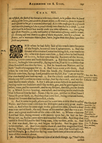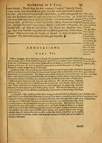He testifieth, the faith of the Centurion who was a Gentile, to be greater than he found among all the Jews, and cures his servant absent. (11) The widow’s son he reviveth and restoreth to her, and is renowned thereupon. (18) To John’s messengers he answereth with miracles, leaving to John to preach thereby unto them that he is Christ. (24) And afterward he declareth how worthy credit was John’s testimony, (29) inveighing against the Pharisees, (31) who with neither of their manners of living could be won, (36) showing also unto them by occasion of Mary Magdalen, how he is a friend to sinners, not to maintain them in sin, but to forgive them their sins upon their faith and penance.
AND when he had fully said all his words into the ears of the People, he entered into Capharnaum. 2And the servant of a certain Centurion being sick, was ready to die: who was dear unto him. 3And when he had heard of Jesus, he sent unto him the Ancients of the Jews, desiring him to come and heal his servant. 4But they being come to Jesus, besought him earnestly, saying to him: That he is worthy that thou shouldest do this for him. 5For he loveth our Nation; and he hath • built a Synagogue for us. 6And Jesus went with them. And when he was now not far from the house, the Centurion sent his friends unto him, saying: Lord, trouble not thyself. for [a] I am not worthy that thou shouldest enter under my roof. 7For the which cause neither did I think myself worthy to come to thee; but say the word, and my servant shall be made whole. 8For I also am a man subject to authority, having under me soldiers: and I say to this, go, and he goeth; and to another, come, and he cometh; and to my servant, do this, and he doeth it. 9Which Jesus hearing, marvelled; and turning to the multitude that followed him he said: Amen I say to you, neither in Israel have I found so great faith. 10And they that were sent, being returned home, found the servant that had been sick, whole.
11And it came to pass, afterward he went into a city that is called Naim; and there went with him his Disciples and a very great multitude. 12And when he came nigh to the gate of the city, behold a dead man was carried forth, the only son of his mother; and she was a widow: and a great multitude of the city with her. 13Whom when our Lord had seen, being moved with mercy upon her, he said to her: Weep not. 14And he came near and touched the coffin. And they that carried it stood still; and he said: Young man, I say to thee, arise. 15And he that was dead, sat up, and began to speak. And he gave him to his mother. 16And fear took them all; and they magnified God, saying: That a great Prophet is risen among us: and, That God hath visited his people. 17And this saying went forth into all Jewry of him, and into all the country about.
18And John’s disciples showed him of all these things. 19And John called two of his disciples, and sent them to Jesus, saying: Art thou he that art to come; or expect we another? 20And when the men were come unto him, they said, John the Baptist hath sent us to thee, saying: Art thou he that art to come; or expect we another? 21(And the self-same hour, he cured many of maladies, and hurts, and evil Spirits: and to many blind he gave sight.) 22And answering, he said to them: Go and report to John what you have heard and seen: * That the blind see, the lame walk, the lepers are made clean, the deaf hear, the dead rise again, 23 [b] the poor are evangelised: and blessed is he whosoever shall not be scandalised in me.
24 * And when John’s messengers were departed, he began to say of John to the multitudes: What went you out into the desert to see? a reed moved with the wind? 25But what went you forth to see? a man clothed in [c] soft garments? Behold they that are in costly apparel and delicacies, are in the house of Kings. 26But what went you out for to see? a Prophet? Certain I say to you, and more than a Prophet. 27This is he of whom it is written: Behold I send mine Angel before thy face, which shall prepare thy way before thee. 28For I say to you: A greater Prophet among the children of women than John the Baptist, there is no man. But he that is the lesser in the Kingdom of God, is greater than he. 29And all the People hearing and the Publicans, justified God, being baptized with John’s Baptism. 30But the Pharisees and the lawyers [d] despised the counsel of God against themselves, being not baptized of him. 31And our Lord said: Whereunto then shall I liken the men of this Generation, and whereunto are they like? 32They are like to children sitting in the market-place, and speaking one to another, and saying: We have piped to you, and you have not danced; we have lamented, and you have not wept. 33For John the Baptist came * neither eating bread nor drinking wine; and you say: He hath a Devil. 34The son of man came eating and drinking; and you say: Behold a man that is a gourmander and a drinker of wine, a friend of Publicans and sinners. 35And wisdom is justified of all her children.
36And one of the Pharisees desired him to eat with him. And being entered into the house of the Pharisee, he sat down to meat. 37And behold a woman that was in the city, a sinner, as she knew that he was set down in the Pharisee’s house, she brought an alabaster box of ointment; 38and standing behind beside his feet, she began to [e] water his feet with tears, and wiped them with the hairs of her head, and kissed his feet, and anointed them with the ointment. 39And the Pharisee that had bid him seeing it, spoke within himself, saying: This man if he were a Prophet, would know certain who and what manner of woman she is which toucheth him, that she is a sinner. 40And Jesus answering said to him: Simon, I have somewhat to say unto thee. But he said: Master, say. 41A certain creditor had two debtors; one did owe five hundred pence, and the other fifty. 42They having not wherewith to pay, he forgave both. Whether therefore doth love him more? 43Simon answering said: I suppose that he to whom he forgave more. But he said to him: Thou hast judged rightly. 44And turning to the woman, he said unto Simon: Doest thou see this woman? I entered • into thy house, water to my feet thou didst not give; but she with tears hath watered my feet, and with her hairs hath wiped them. 45Kiss thou gavest me not; but she since I came in, hath not ceased to kiss my feet. 46With oil thou didst not anoint my head; but she with ointment hath anointed my feet. 47For the which I say to thee: Many sins are forgiven her, because she hath [f] loved much. But to whom less is forgiven, he loveth less. 48And he said to her: Thy sins are forgiven thee. 49And they that sat together at the table began to say within themselves: [g] Who is this that also forgiveth sins? 50And he said to the woman: • Thy faith hath made thee safe, go in peace.
Footnotes
- ↑ See the Annotations upon St. Matth. c. 8, 8.
- ↑ Pauperes evangelizantur, that is, to the poor the Ghospel is preached, and they receive it.
- ↑ Mark this well concerning John’s apparel and diet. See the Annotations upon S. Matth. c. 3, 4.
- ↑ As they that contemned John’s Baptism, despised God’s counsel and wisdom; so much more they that make no account of the Sacraments of the Church, despise God’s counsel and ordinance touching their salvation, to their own damnation.
- ↑ A perfect pattern of true penance in this woman, who sought of Christ with open tears and other strange works of satisfaction and devotion, remission of her sins.
- ↑ Not only faith (as you may perceive) but love or charity obtaineth remission of sins.
- ↑ As the Pharisees did always carpe Christ for remission of sins in earth, so the Heretic reprehend his Church that remitteth sins by his authority.
ANNOTATIONS. CHAP. 7.
↑ 5. Built a Synagogue.) As at that time to found a Synagogue, was acceptable to God, and procured the prayers of the faithful People for whose use it was made: so now much more in the new Testament, to build a Church, Monastery, College, or any like work for the honour and service of God, is grateful to him and procureth the prayers of the good People for whose use such things be founded.
↑ 44. Into thy house.) An exceeding approbation of the extraordinary works and signs of external devotion, which seem to carnal men (though otherwise faithful) to be often superfluous or not acceptable. This Simon was perhaps of a good will, and therefore (as diverse others did elsewhere) invited Christ to his house, not of curiosity or captiousness, as some other did: but of affection, as it may seem by Christ’s familiar talk with him. Notwithstanding his duties towards him were but ordinary. But the anointing, washing, kissing, wiping of his feet in such sort as the woman did, were further signs of more than vulgar love: such as is in devout men or women that go on pilgrimage and kiss devoutly the holy memories of Christ and his Saints. Which is no more but an exterior expressing of their affection, and that they love much, as every vulgar christian man doth not.
↑ 50. Thy faith.) The remission of her sins being attributed before to charity, is now also said to come of her faith. Whereby you may know that it commonly proceedeth of both, and of hope also, though but one named. Because when there be diverse causes concurring to one effect, the scriptures commonly name but one, and that especially which is most proper to the purpose and time, not excluding the other. And therefore his working miracles upon any person, is attributed to the faith of them on whom or at whose desire they be done. Because he wrought his miracles to induce all men to believe in him; and therefore specially required faith at their hands, and namely before other things, whether they did believe that he was able to do that which they asked at his hands: without which it had been rather a mockery and tentation of him, than a true desire of benefit at his hands.
Margin Notes
- 11–16. The Ghospel upon the 15th Sunday after Pentecost. And upon Thursday in the 4th week of Lent. And for St. Monica, S.Augustin’s mother, May 4.
- annot. 5. Building of Churches, Monasteries, &c.
- annot. 44. Exterior signs of more than common devotion.
- annot. 50. Justification attributed not to faith only.
Margin References
- 7. Mat. 8, 5.
- 22. εχαρισατο. Esa 35, 5. 61, 1.
- 24. Mat. 11, 7.
- 27. Mal. 3, 1.
- 33. Mat. 3, 4.



